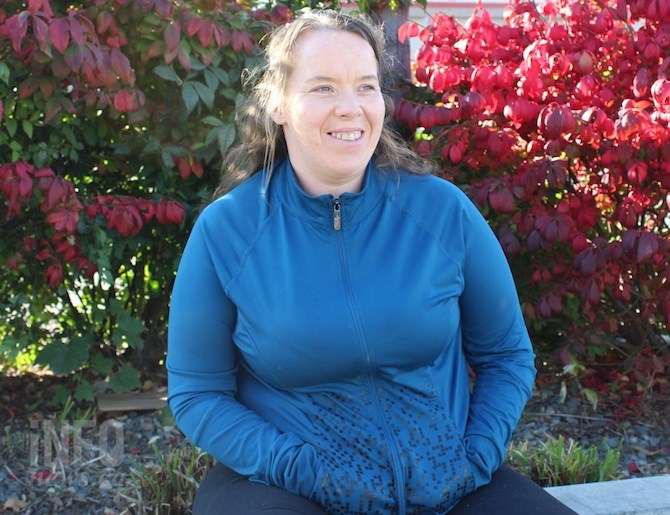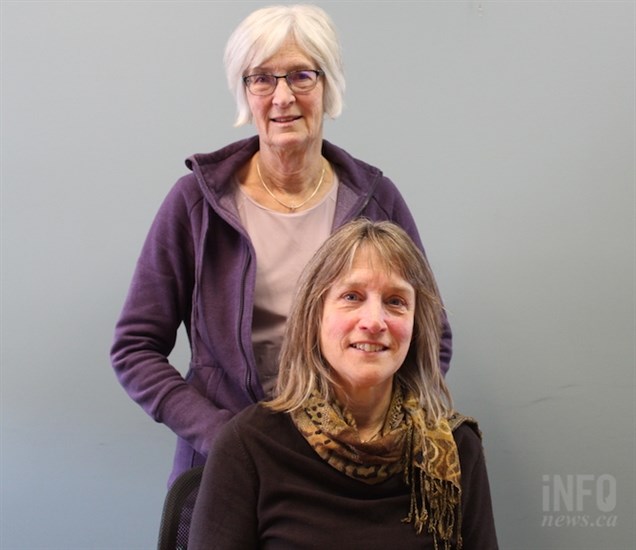
As a woman who has spent time in and out of the correctional system in B.C., Jenna-Lee Frost, 34, is familiar with the conditions of being kept in city RCMP holding cells.
(KAREN EDWARDS / iNFOnews.ca)
October 17, 2019 - 7:30 AM
Jenna-Lee Frost is no stranger to being behind bars, whether it’s in city cells at the downtown Kamloops RCMP detachment or in the Lower Mainland at an all women’s prison.
Over the years, the 34-year-old struggled with a heroin addiction which has brought her face-to-face with crime. Some of her recent charges range from assault to breaches.
She was most recently acquitted of a break and enter charge from 2017.
But like many women who find themselves in custody throughout B.C.’s southern Interior, she has often found herself dealing with much harsher conditions because prisons and local lock-ups aren't equipped or prepared to deal with women. For routine court hearings, she is forced to travel then sometimes make extended stays in city cells, often without exercise, sunlight, access to medical care or items like toothbrushes or menstrual products.
Often those conditions await women even before they are convicted, if they are convicted and all because the province has just one small prison option to house women in the southern Interior for every woman in custody south of Prince George.
The last time Frost was in city cells, she remembers going through bad withdrawals from heroin and was already on her fifth day at the local police detachment cells, where services like showers, healthcare and visitors are limited.
“I was puking and I asked to go to the hospital, they told me I could sweat it out,” Frost says. “I was shaking, turning blue… no matter how many times I asked to go to the hospital they just kept saying ‘no, it’s not life-threatening.’
Limited access to healthcare isn’t an uncommon situation for prisoners placed in city holding cells, according to Penny Douglass who works with the legal aid services with the Kamloops Elizabeth Fry Society.
Recently, the idea of bringing in a women’s wing to Kamloops Regional Correctional Centre was brought up during a meeting at the Union of B.C. Municipalities convention in Vancouver last month between Kamloops council and B.C. Corrections.
A spokesperson with B.C. Corrections says at this time, they are currently not considering adding a female remand centre to the Kamloops facility.
“This is because sufficient regional capacity exists to safely house women in custody,” Colin Hynes with the Ministry of Public Safety and Solicitor General says in an emailed statement.
He wasn't more specific but if he's referring to the reliance on local RCMP cells in Kamloops, Kelowna, Vernon, Penticton and others, some of those communities already recognize the need for proper facilities hold women, let alone using these facilities for men to serve sentences.
“The bottom line is, there is no place to take female prisoners that are arrested in this region so we wind up by default housing them at the detachment cells in Kamloops,” Kamloops Mayor Ken Christian says.
Currently in B.C., the only prisons able to house female prisoners are at the Alouette Correctional Centre for Women in Maple Ridge, the women’s wing at Prince George Regional Correctional Centre, and a wing at the Okanagan Correctional Centre.

Penny Douglass and former executive director of The Kamloops and District Elizabeth Fry Louise Richards have been advocating for better conditions for female inmates locally.
(KAREN EDWARDS / iNFOnews.ca)
Housing prisoners at the city detachment cells is an expensive solution to taxpayers, Christian says, but it also violates a prisoners’ bill of rights when compared to the resources offered to prisoners in provincial correctional facilities.
For Frost, the longest time she has spent in holding cells was roughly two weeks nearly two years ago. She says it was problematic getting to shower or even getting a toothbrush.
“We don’t get any fresh air, we don’t get a window, we don’t get any time out, the lights are always on," she says.
Unlike their male counterparts who are generally transferred to Kamloops Regional Correctional Centre, if females cannot be transferred right away to the Lower Mainland, they are forced to spend several days and in some cases a few weeks at local city cells.
Christian says he is aware of a female prisoner who is currently serving a 60-day intermittent jail sentence at the detachment on the weekends.
“She is essentially in solitary confinement for 48 hours at a time because there is no female correctional facility that would provide the kind of supports that you would need to provide prisoners in the modern-day,” Christian says. “Wraparound services like psychologists, criminologists that are going to help with rehabilitating people.”
Social agencies groups like The Kamloops and District Elizabeth Fry Society have been advocating for years for changes in the way female prisoners are housed locally. The society has been responsible for several years for supplying clothes and hygiene packages for women who are brought into holding cells.
“I mean city cells was never set up to house men and women,” Louise Richards, former executive director of Kamloops Elizabeth Fry says. “There was never accommodation made for the fact that there would be women in there.”
There are 12 cells at the downtown Kamloops RCMP detachment but Christian says most of them need to be kept open for day-to-day arrests.
“This is not a custody kind of place but it's being used as that unfortunately because there is no alternative,” he says. “The bottom line for female prisoners, we need to do better and there’s a prisoners’ bill of rights and we need to make sure we deal with that appropriately.”
Richards and Douglass say they would like to see incarcerated women left closer to their communities but it’s not something they see happening anytime soon.
“It’s a numbers thing. They aren’t going to build a women’s prison everywhere,” Douglass says.
To contact a reporter for this story, email Karen Edwards or call (250) 819-3723 or email the editor. You can also submit photos, videos or news tips to the newsroom and be entered to win a monthly prize draw.
We welcome your comments and opinions on our stories but play nice. We won't censor or delete comments unless they contain off-topic statements or links, unnecessary vulgarity, false facts, spam or obviously fake profiles. If you have any concerns about what you see in comments, email the editor in the link above.
News from © iNFOnews, 2019